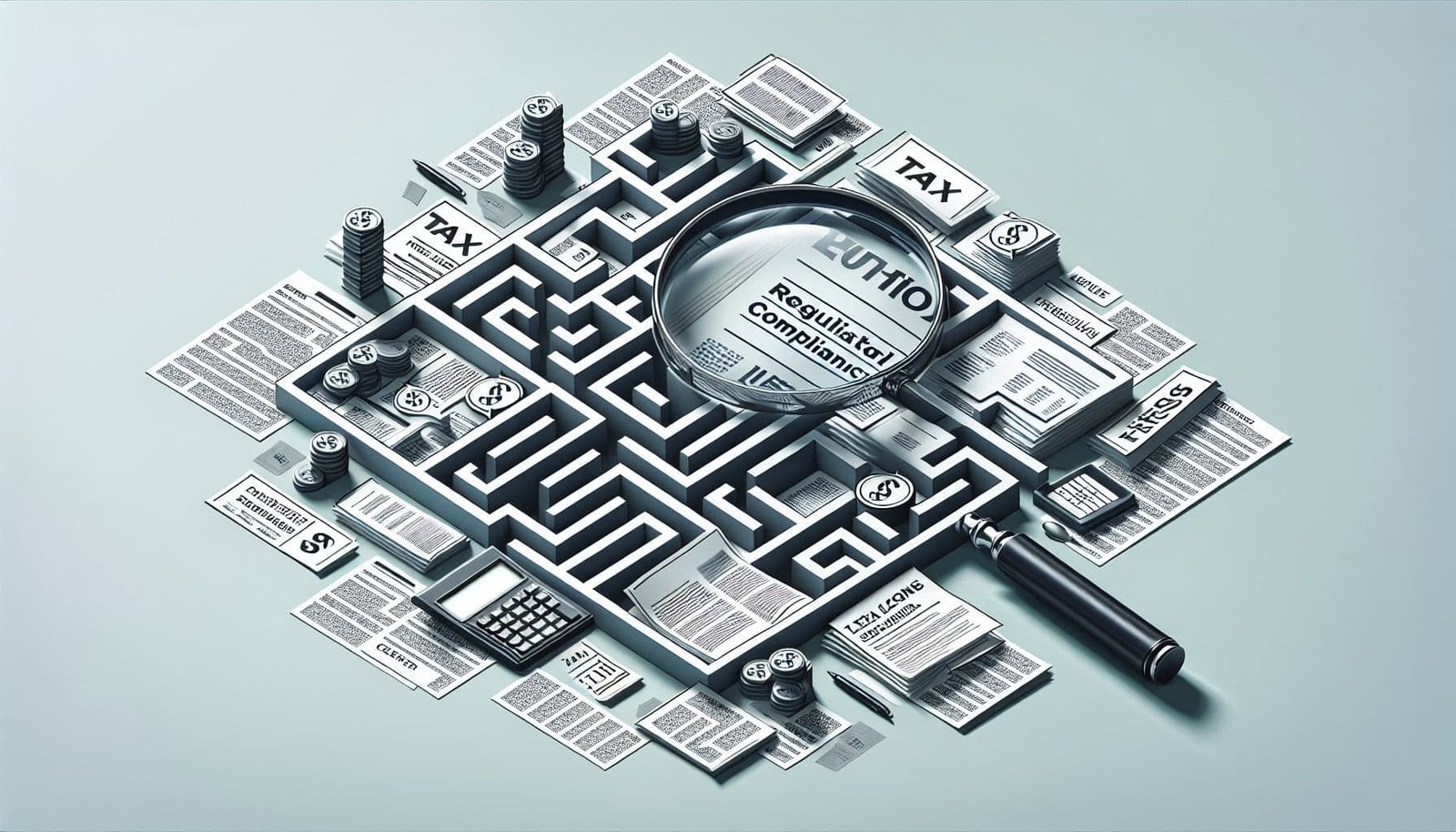In today’s interconnected global economy, it is crucial for businesses to navigate the maze of local regulations and tax obligations. Staying compliant with these laws not only ensures that you are operating ethically and responsibly, but also minimizes the risk of penalties and legal issues. Whether you are a small startup or a multinational corporation, understanding and adhering to local regulations and tax obligations is essential for the success and sustainability of your business. In this article, we will explore the importance of regulatory compliance and provide practical tips to help you stay on top of local regulations and tax obligations. From understanding licensing requirements to staying updated on tax changes, this guide is your ally in navigating the complex world of compliance.

Local Regulations
Understanding the Regulatory Landscape
When it comes to regulatory compliance, one of the first steps is to gain a clear understanding of the local regulatory landscape that applies to your business or industry. This involves identifying the specific regulations that govern your operations and familiarizing yourself with their requirements. These regulations can vary greatly depending on the jurisdiction and the nature of your business. By understanding the regulatory landscape, you can ensure that you are aware of all the obligations you need to fulfill to remain compliant.
Industry-Specific Regulations
In addition to the general local regulations, many industries also have specific regulations that apply to them. These regulations are designed to address the unique risks and challenges that are specific to each industry. For example, the healthcare industry has regulations regarding patient privacy and data security, while the banking sector has regulations to ensure financial stability and consumer protection. It is important to thoroughly research and understand these industry-specific regulations to ensure that you are fully compliant and operating within the boundaries.
Licensing and Permits
Obtaining the necessary licenses and permits is a crucial aspect of regulatory compliance. Depending on your business activities, you may need to obtain specific licenses or permits from the relevant authorities. These licenses and permits not only demonstrate your compliance with the regulations but also give you the legal permission to operate in your industry. Failing to obtain the necessary licenses and permits can lead to severe penalties and even legal consequences. It is important to thoroughly research and understand the licensing requirements applicable to your business and ensure that you obtain the necessary approvals before commencing operations.
Compliance Monitoring and Reporting
Once you have understood the local regulations and obtained the required licenses and permits, the next step is to establish a system for compliance monitoring and reporting. This involves regularly monitoring your operations to ensure that they align with the regulatory requirements and promptly addressing any non-compliance issues. It also includes the preparation and submission of various compliance reports to the relevant regulatory authorities. Compliance monitoring and reporting play a crucial role in demonstrating your commitment to regulatory compliance and can help you avoid any potential penalties or legal consequences.
Tax Obligations
Understanding Tax Laws
Tax compliance is another critical aspect of regulatory compliance. It is essential to have a clear understanding of the tax laws and regulations that apply to your business. This includes knowing the different types of taxes you are required to pay, such as income tax, sales tax, or value-added tax, and understanding the specific rules and regulations related to each tax. By understanding the tax laws, you can ensure that you accurately calculate and pay your taxes, avoiding any potential non-compliance issues.
Tax Registration and Identification Numbers
To fulfill your tax obligations, you will typically need to register your business with the relevant tax authorities and obtain a tax identification number. This number is used to identify and track your tax payments and filings. It is essential to go through the necessary registration procedures and obtain the correct identification numbers to ensure that you are legally recognized and properly accounted for in the tax system.
Filing Taxes and Deadlines
Filing taxes accurately and within the specified deadlines is a crucial component of tax compliance. The tax authorities will typically require you to submit various tax forms and returns on a regular basis, reporting your income and expenses, as well as any applicable deductions or credits. It is important to stay aware of the filing deadlines and ensure that you meet them in a timely manner. Failure to file taxes or missing the deadlines can result in penalties, fines, and legal consequences.
Tax Deductions and Credits
Understanding the various tax deductions and credits available to your business can help reduce your tax liability. Tax deductions are expenses that can be subtracted from your taxable income, reducing the amount of tax you owe. Tax credits, on the other hand, directly reduce the amount of tax you owe. It is essential to carefully review the tax laws and consult with a tax advisor to identify and utilize all the eligible deductions and credits, ensuring that you optimize your tax position while remaining compliant.
Potential Consequences of Non-Compliance
Penalties and Fines
Non-compliance with local regulations and tax obligations can result in various consequences, with penalties and fines being among the most common. Regulatory authorities have the power to impose financial penalties based on the severity of the non-compliance. These penalties can range from minor fines to substantial amounts that can seriously impact the financial stability of a business. By ensuring compliance, you can avoid these penalties and protect your business from unnecessary financial burdens.
Damage to Reputation
Non-compliance can also damage a company’s reputation. In today’s interconnected and socially conscious world, news of non-compliance can spread rapidly, tarnishing a company’s image and eroding public trust. Customers, suppliers, and investors may lose confidence in a business that has a poor compliance record. Building and maintaining a good reputation takes time and effort, and non-compliance can quickly undo all the hard work, leading to significant long-term consequences for a business.
Legal Consequences
Non-compliance can also lead to legal consequences. Violating local regulations or tax laws can result in legal action being taken against a business or its responsible individuals. This can involve civil lawsuits, criminal charges, or administrative penalties. Legal consequences can be costly, time-consuming, and have long-lasting impacts on a business and its stakeholders. By ensuring regulatory compliance, businesses can mitigate the risk of facing legal consequences and maintain their legal standing and reputation.
Compliance Strategies and Best Practices
Staying Updated with Regulations
Regulations and tax laws are not static; they can change and evolve over time. It is crucial to stay updated with any changes or updates related to the regulations that apply to your business. This can be done by regularly monitoring official government sources, subscribing to industry newsletters and publications, and engaging with professional organizations that provide updates on regulatory changes. By staying informed, you can proactively adapt your business practices to remain compliant.
Engaging Legal and Tax Advisors
Navigating the complexities of regulatory compliance can be challenging. Engaging the services of legal and tax advisors can provide valuable expertise and guidance. These professionals can help interpret and apply the regulations to your specific business circumstances, ensuring that you are fully compliant. They can also assist in identifying any potential non-compliance issues and help devise strategies to mitigate these risks. By working closely with legal and tax advisors, you can enhance your compliance efforts and minimize the likelihood of non-compliance.
Creating a Compliance Framework
Establishing a compliance framework is essential for ensuring ongoing compliance. This framework should include clear policies and procedures that outline the steps and processes required to meet the regulatory and tax obligations. It should incorporate internal controls and checks to monitor and identify any non-compliance issues promptly. The compliance framework should be regularly reviewed and updated to reflect any changes in regulations or business practices. By having a robust compliance framework in place, businesses can proactively manage and mitigate compliance risks.
Employee Training and Education
The role of employees in regulatory compliance is crucial. They are on the front lines of the business operations and can greatly impact overall compliance efforts. Providing comprehensive training and education to employees about the relevant regulations and tax obligations is essential. This can help employees understand their roles and responsibilities, identify potential non-compliance issues, and take appropriate actions to ensure compliance. Ongoing training and education programs can keep employees informed about any changes in regulations and reinforce the importance of compliance in all aspects of the business.

The Role of Technology in Regulatory Compliance
Automation and Compliance Software
Technological advancements have greatly facilitated regulatory compliance efforts. Automation and compliance software can streamline and simplify various compliance tasks, such as monitoring compliance, generating reports, and maintaining documentation. These tools can help businesses automate routine compliance processes, reduce the risk of human error, and improve efficiency. By leveraging technology, businesses can enhance their compliance efforts and ensure more accurate and timely compliance.
Data Security and Privacy
Regulatory compliance often involves handling sensitive data, such as customer information or financial records. Protecting this data and ensuring its security and privacy is a critical aspect of compliance. Businesses need to implement robust data security measures, such as encrypted communications, access controls, and regular data backups. They must also comply with applicable data privacy regulations, such as the General Data Protection Regulation (GDPR) in the European Union. By prioritizing data security and privacy, businesses can maintain compliance and protect the trust of their customers and stakeholders.
Audit Trails and Documentation
Maintaining comprehensive audit trails and documentation is essential for regulatory compliance. It is important to document and track all compliance-related activities, including risk assessments, compliance monitoring, and corrective actions taken. In the event of an audit or inspection, having well-documented records can significantly expedite the process and demonstrate your commitment to compliance. Technology can play a crucial role in efficiently managing and storing these records, ensuring that they are easily accessible and searchable when needed.
International Compliance Considerations
Global Regulations and Tax Treaties
If your business operates internationally or has dealings with foreign entities, it is important to consider global regulations and tax treaties. Different countries have their own regulations and tax laws that may differ from those in your home jurisdiction. Additionally, tax treaties between countries can impact how taxes are calculated and paid on international transactions. Understanding these global regulations and tax treaties is crucial for maintaining compliance while conducting international business activities.
Cultural and Language Challenges
Operating internationally also brings cultural and language challenges that can impact compliance efforts. Different cultures may have different expectations and norms regarding business practices and ethical conduct. Language barriers can make it difficult to understand and comply with foreign regulations. It is important to actively address these challenges by engaging local experts, translators, and interpreters who can facilitate effective communication and help navigate cultural nuances. By being sensitive to these challenges, businesses can strengthen their compliance efforts in international operations.
Risk Assessment and Due Diligence
When expanding into international markets or engaging with foreign partners, conducting thorough risk assessments and due diligence is critical. This involves evaluating the compliance risks associated with the specific country or partner and assessing their compliance track record. It is important to identify any potential red flags, such as past non-compliance incidents or regulatory issues, which can jeopardize your own compliance efforts. By conducting comprehensive risk assessments and due diligence, businesses can make informed decisions and minimize the risk of non-compliance in international operations.

Risk Mitigation and Internal Controls
Internal Compliance Monitoring
To effectively manage compliance risks, businesses should establish internal compliance monitoring processes. This involves regularly assessing and monitoring internal operations to identify any non-compliance issues. Implementing internal controls, such as segregation of duties and transaction monitoring, can help detect and prevent non-compliant activities. By conducting periodic internal compliance audits and assessments, businesses can proactively identify and address any potential non-compliance risks, ensuring ongoing compliance.
Documented Policies and Procedures
Clear and well-documented policies and procedures are essential for establishing internal controls and ensuring compliance. These policies and procedures should outline the steps and processes for performing various tasks, such as financial transactions, data handling, and reporting. They should also communicate the expected ethical conduct and compliance requirements to employees. By having documented policies and procedures in place, businesses can provide clear guidance to employees, minimize the risk of non-compliance, and facilitate consistent compliance practices across the organization.
Regular Audits and Assessments
Conducting regular compliance audits and assessments is important to evaluate the effectiveness of compliance efforts and identify any gaps or areas for improvement. These audits can be conducted internally or by independent third parties, depending on the size and complexity of the business. Regular assessments can help identify any non-compliance issues, assess the adequacy of internal controls, and ensure that the compliance framework remains up to date. By conducting periodic audits and assessments, businesses can continually enhance their compliance efforts and minimize the risk of non-compliance.
Collaboration with Regulatory Agencies
Proactive Engagement and Communication
Proactively engaging with regulatory agencies is a key aspect of regulatory compliance. Establishing open lines of communication and maintaining a positive relationship with regulatory authorities can help foster mutual understanding and cooperation. It is important to keep regulatory agencies informed about any significant changes in your business that may impact compliance. By proactively engaging and communicating with regulatory agencies, businesses can demonstrate their commitment to compliance and build a collaborative relationship.
Responding to Audits and Inspections
In the event of an audit or inspection by regulatory agencies, it is essential to respond promptly and cooperatively. These audits can involve a thorough examination of the business’s operations, records, and compliance practices. It is important to provide the necessary documentation and information requested by the regulatory authorities and address any non-compliance issues that may arise. By responding effectively to audits and inspections, businesses can demonstrate their commitment to compliance and minimize any potential negative consequences.
Maintaining Relationships with Regulators
Maintaining ongoing relationships with regulatory agencies beyond audits and inspections can be beneficial. Regular communication and engagement with regulatory authorities can help businesses stay informed about any regulatory changes or updates that may impact their operations. Building strong relationships can also provide opportunities for businesses to provide feedback on proposed regulations or contribute to industry discussions on compliance issues. By maintaining positive relationships with regulators, businesses can stay ahead of regulatory changes and foster a collaborative compliance environment.

Examples of Regulatory Compliance Failures
Enron Scandal
The Enron scandal is a prominent example of regulatory compliance failure. Enron, once a highly regarded energy company, engaged in fraudulent accounting practices to manipulate its financial statements and deceive investors. The scandal resulted in one of the largest corporate bankruptcies in history and led to the collapse of Arthur Andersen, Enron’s auditor. The Enron scandal highlighted the need for stricter regulatory oversight and enforcement to prevent such fraudulent activities and protect investors.
Volkswagen Diesel Scandal
The Volkswagen diesel scandal is another well-known case of regulatory compliance failure. Volkswagen, a leading automobile manufacturer, installed software in its diesel vehicles to cheat emissions tests. The discovery of this fraudulent practice led to massive recalls, significant financial penalties, and damage to the company’s reputation. The scandal exposed weaknesses in the regulatory system and led to calls for stricter emissions standards and better oversight of the automotive industry.
Wells Fargo Account Fraud
The Wells Fargo account fraud scandal is an example of non-compliance with ethical and regulatory standards. Wells Fargo employees opened millions of unauthorized bank and credit card accounts in an effort to meet aggressive sales targets. The scandal resulted in substantial fines, the departure of top executives, and damage to the bank’s reputation and customer trust. The Wells Fargo case highlighted the importance of fostering a strong ethical culture within an organization and ensuring adequate oversight and compliance monitoring to prevent such misconduct.
The Future of Regulatory Compliance
Emerging Technologies and Challenges
The future of regulatory compliance will be influenced by emerging technologies and the challenges they present. Advancements in artificial intelligence, machine learning, and automation can enable more efficient compliance processes and improve the accuracy of compliance monitoring. However, these technologies also raise concerns about data privacy, cybersecurity, and the potential for biased decision-making. As new technologies continue to evolve, businesses and regulators will need to adapt and develop frameworks that address these challenges while promoting compliance.
Evolving Regulatory Frameworks
Regulatory frameworks will continue to evolve in response to changing business landscapes, societal expectations, and emerging risks. Governments and regulatory authorities worldwide are increasingly recognizing the need for robust regulations to ensure fairness, transparency, and accountability. This involves regular updates to existing regulations and the introduction of new regulations to address emerging issues, such as data protection, climate change, and emerging technologies. Staying informed and adapting to these evolving regulatory frameworks will be crucial for businesses to maintain compliance.
Industry and Global Harmonization
As businesses increasingly operate across borders, the need for industry and global harmonization of regulations becomes more pressing. Harmonization efforts aim to align regulatory requirements in different jurisdictions to reduce compliance burdens and promote consistency. International organizations, such as the International Organization for Standardization (ISO), play a crucial role in developing standards and frameworks that facilitate harmonization. By supporting industry and global harmonization efforts, businesses can streamline compliance efforts and reduce complexity associated with operating in multiple jurisdictions.
In conclusion, regulatory compliance is a vital aspect of running a business and fulfilling tax obligations. Understanding the local regulatory landscape, complying with industry-specific regulations, and obtaining the necessary licenses and permits are fundamental steps. Failing to comply can result in penalties, damage to reputation, and even legal consequences. Implementing compliance strategies, leveraging technology, considering international compliance considerations, and establishing robust internal controls are key to maintaining compliance and mitigating risks. Collaboration with regulatory agencies, learning from compliance failures, and anticipating future developments will also contribute to building a compliant and sustainable business. By prioritizing regulatory compliance, businesses can ensure their long-term success and contribute to a harmonious and transparent business environment.


